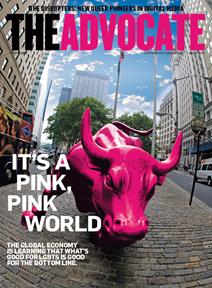
LOS ANGELES — “Good for business” has become a rallying cry for LGBT activists, and multinational corporations interested in the bottom line are taking heed. Will money be the vehicle that drives LGBT equality around the globe? For its October/November 2014 cover story, The Advocate contributor Jeremy Lybarger examines why allying with LGBT consumers is no longer enough to foster unconditional goodwill to a brand, and why companies now need strategies that are more sustainable, more systematic, and–not least of all–more far-reaching.
Several organizations have sprouted up to help advise corporations on how to achieve these strategies, include the Global Equality Fund, launched by Secretary of State Hillary Clinton in 2011; Out Leadership, which connects senior executives from law, insurance, and finance in order to leverage the collective reach of those industries; and Out and Equal Workplace Advocates.
For his story, Lybarger talked to representatives from these organizations. Scott Busby, deputy assistant secretary of the Bureau of Democracy, Human Rights and Labor, under the State Department, noted that they Department is advocating for LGBT issues aboard, but it’s a careful dance. “It’s very situation specific,” he tells The Advocate. “Sometimes we speak out and we want companies to speak out. In a lot of circumstances, though, it involves quiet diplomacy. Quiet conversations between us and the host government, between companies and the host government.” He later continues, “A lot of people out there in the world care about whether or not companies are living by and respecting human rights in the work that they do.”
For Todd Sears, found of Out Leadership, consensus around human rights is secondary. “I primarily focus on the business sustainability and the business bottom line impact,” he says. “I call it ‘return on equality.’” Sears believes business is a business-first conversation is more effective than one about human rights or culture or religion. “It’s a universal driver. Lots of things don’t translate. Cultures are different. Pop stars may be popular one place but not others. Movies can be popular one place but not others. But business is something that everybody understands, and commerce is something the every country needs.”
Now that President Obama has signed an executive order protecting LGBT contracted government workers, it may be a lucrative opportunity for organizations to help rehabilitate corporate offenders. And as companies look to standardize equality laws, it will be critical for companies that expand overseas. But there’s a danger in think these potential American can be exported abroad. “It’s very easy from the outside to say ‘make a policy,’ but you may be risking people’s lives,” says Thom Lynch, chief development officer at Out and Equal Workplace Advocates. “The last thing we want is to be an American organization that goes into a foreign country and tells them what to do.”
Out Leadership’s Sears believes global standards of equality are a matter of making LGBT acceptance a nonnegotiable part of foreign government’s infrastructure. “It’s good for safety to have OSHA regulations, right? If a company is going to build a new headquarters in India, they want to make sure the government actually has regulations on the building because businesses care about the safety of their employees and the longevity of their business. It’s no different – just as you had to have building codes up to speed, you have to have LGBT inclusion up to speed.” This also implies that American corporations must be prepared to invest heavily in communities abroad. And because the tide of history is inexorable and uprooting, these companies must also be prepared to weather some storms.
Read The Advocate’s full October/November cover story now at:
http://www.advocate.com/world/2014/09/08/exporting-equality-pink-dollar











